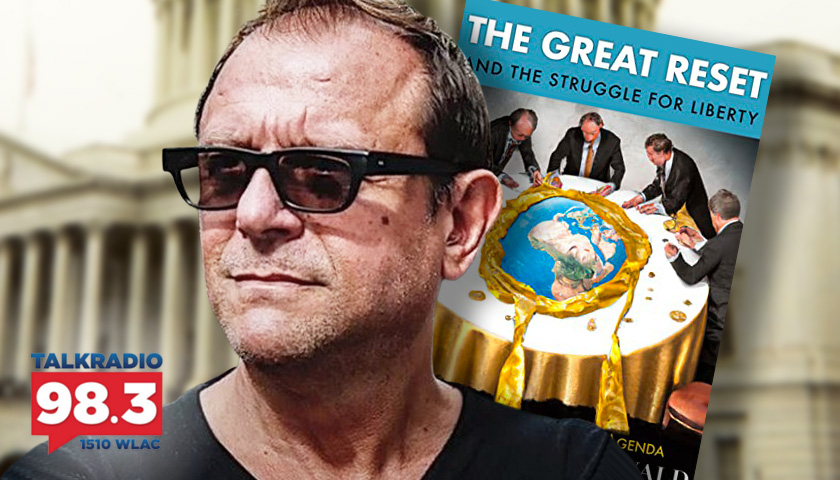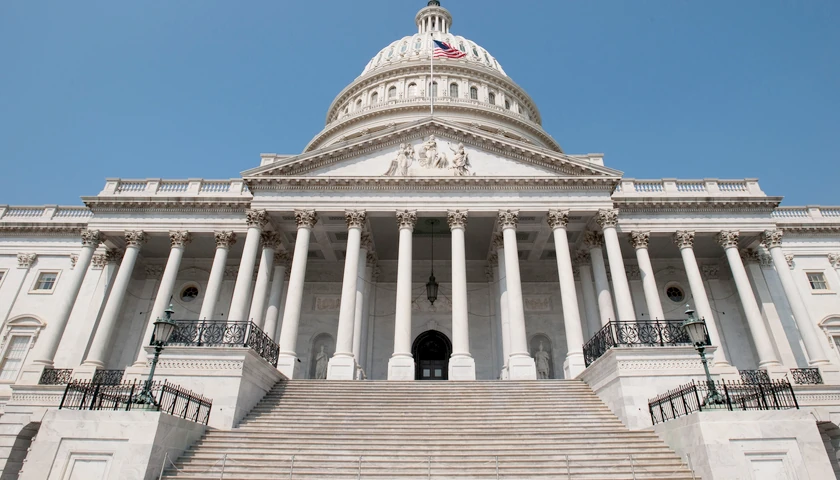Live from Music Row, Friday morning on The Tennessee Star Report with Michael Patrick Leahy – broadcast on Nashville’s Talk Radio 98.3 and 1510 WLAC weekdays from 5:00 a.m. to 8:00 a.m. – host Leahy welcomed former New York University (NYU) professor and author Michael Rectenwald to the newsmaker line to talk about his new book, The Great Reset.
Leahy: We are joined now on our newsmaker line by our very good friend Professor Michael Rectenwald, who is a former NYU professor, a supporter of honesty, integrity, and liberty, who has a new book out called The Great Reset. Good morning, Michael! Great to have you here.
Rectenwald: Great to be here, Michael. Thanks for having me.
Leahy: Tell me a little bit about the great reset.
Rectenwald: The great reset is a project undertaken by the World Economic Forum to basically accelerate the meeting of the UN 2030 agenda. And to do so they have corralled and cooperated with and signed on thousands of corporate partners to bring about a great reset in the economy, our behavior, and basically our way of life.
This is an ongoing project, and it is underway now and it is a very nefarious ploy and plot on the part of these globalists to institute their new stakeholder capitalism.
Leahy: Which basically means control of us by them. Am I right on that?
Rectenwald: Absolutely. It comes down to total control, and we see the effects of this in our economic system and our conditions. Right now, they’re trying to destroy fossil fuels.
They’re trying to control our behavior, and they’re going to introduce more technologies to try to control our behavior and even to institute central bank digital currency such that we would be basically under surveillance for all of our transactions which they would then have the ability to control through the Fed in the United States, for example.
Leahy: Can you put us into the mindset of the people putting this together? What are they thinking about the rest of us?
Rectenwald: They believe that the vast majority represents a scourge on the planet and that they need to stop that. They need to control us because we represent a threat to their idea of utopia.
They have an idea of their own sort of Eden, if you will, and they think that we’re basically encroaching on it. And likewise, they need to curb our behavior.
They need to control it, and they need to keep us in place. And that’s what all of these technologies and the economic system and population control ethics, so called, are all about.
Leahy: They have huge financial resources under their control, and people that work for these companies want to move up the ladder. But the big guys, the leaders are making huge amounts of money and basically not doing a lot of the work, but setting the policies. Now you have a solution.
And I’m delighted to see this, because people have been talking about the great reset but have had no particular plan for stopping the great reset. You have put together what you call the grand refusal. It’s a nine-point plan. Tell us about some of those points.
Rectenwald: Yes, I mean this is a nine-point plan to stop the great reset, which I call part of a grand refusal. And some of the points are, for example, we need to refuse central bank digital currency because this will give the state surveillance overspending, savings, and debt control, and all of our transactions.
Even using a digital identity to profile up and even possibly cutting people out of the economy entirely. So we need to refuse central bank digital currency.
Leahy: In other words, keep cash. Right?
Rectenwald: Cash, gold, other means of exchange, definitely. And on those lines, we need to basically foster and develop parallel economic structures because a parallel economic system is going to be necessary to evade the kind of control mechanisms that they have in mind.
Leahy: Let’s talk about that. In fact, when you talk about parallel economic systems, most of our industries are dominated by these large corporations that are part of the great reset. Maybe Hobby Lobby and Chick-fil-A are a couple of companies that don’t want to be part of this.
But pretty much every other company is signing up for this stuff. If you’re a participant in this industry, in one of these industries, let’s say, oh, I don’t know, food, and agriculture, how do you fight it? How do you set up a parallel economy?
Rectenwald: Well, you have to find local farmers, farmers’ markets, et cetera. You have to find producers who are not going to be beholden and taken in by this system, and they’re out there, but you need to do some research to find who they are.
Leahy: So it’s a lot of work, and that’s part of the issue. It’s interesting. Let me just as an aside, the business schools of America, right? What do they teach? I went to one of these business schools. I went to Stanford Business School, got an MBA a long time ago.
But one of the things that they would teach you is what they really want to do in order to make money. What you want to do is differentiate your product and then, within that differentiated niche, establish a monopoly so you can charge higher prices.
That’s what they’re teaching at these business schools, and they’ve been very effective at creating an economy based on that approach. When you don’t have the capital and when you don’t have the ability to create that differentiation, how do you create a successful company to compete?
Rectenwald: One of the things is that there are a number of companies that are not subscribing to it. For example, the ESG score, the environmental, and the social governance score. So those companies exist, and there are funds that you can buy that are free of ESG indexing now.
Leahy: Like the one that Vivek Ramaswami set up out of Columbus, Ohio.
Rectenwald: Yes, exactly right. And also, we do have some legislative tools at our disposal. We need to pressure our representatives, both local and federal, to resist the ESG and perhaps bring antitrust legislation against it, because it is, as you suggested, it’s a monopoly scheme.
It’s a monopoly scheme to drive out all competitors from the marketplace and to leave only these few oligarchs in control of the economic structure. So we need to look at the ESG and avoid ESG indexing funds. We need to get our money out of ESG reporting banks. That’s mostly the majors.
Leahy: That’s most major banks, right?
Rectenwald: Yes, it is. Bank of America for example, Brian Moynihan, CEO of Bank of America, is a huge supporter and endorser and a compliant figure in the ESG stakeholder capitalism scheme.
Look at your bank and see if they’re reporting ESG and if they’re lending on the basis of ESG, get your money out of that bank because they’re feeding the beast.
To learn more about Michael Rectenwald and his books, visit him online at michaelrectenwald.com.
Listen to today’s show highlights, including this interview:
– – –
Tune in weekdays from 5:00 – 8:00 a.m. to The Tennessee Star Report with Michael Patrick Leahy on Talk Radio 98.3 FM WLAC 1510. Listen online at iHeart Radio.
Photo “Michael Rectenwald” by Michael Rectenwald. Photo “The Great Reset” by Amazon. Background Photo “U.S. Capitol” by Ken Lund. CC BY-SA 2.0.





